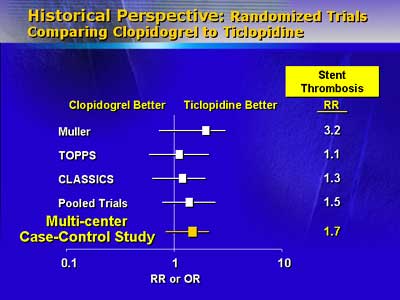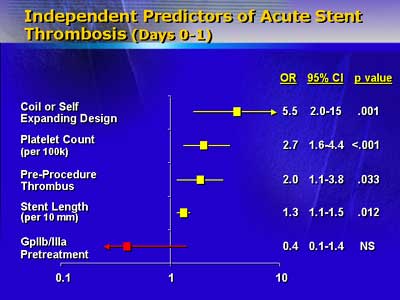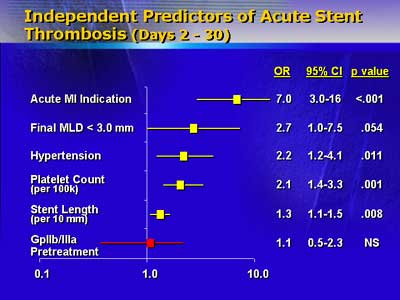|
Patients who received an anti-platelet regimen
containing clopidogrel were at greater risk of stent thrombosis
compared with patients who received a regimen containing ticlopidine.
The results suggest clopidogrel-containing regimens may provide
less protection against stent thrombosis than ticlopidine-containing
regimens.
In recent years, many members of the interventional cardiology community
have substituted clopidogrel for ticlopidine as anti-platelet therapy
after stenting. They switched to the newer thienopyridine derivative
because of studies that show clopidogrel has a superior side effect
profile, particularly in nuisance side effects such as skin rash
and gastrointestinal problems.
One question that has not been answered is whether clopidogrel is
superior to ticlopidine for preventing stent thrombosis. No study
to date has had enough statistical power to prove this hypothesis.
Indeed, several studies have pointed in the opposite direction.
Dr. Rinaldi and colleagues performed a multicenter, case-control
study comparing the ability of these two anti-platelet agents to
prevent stent thrombosis.

Some of the centers involved in this study included Vanderbilt University
Medical Center, Mayo Clinic, and Duke University Medical Center,
among others. A total of 14 clinical sites participated.
Investigators identified 197 cases of angiographically confirmed
stent thrombosis, and then matched each case with a single control
from the same institution. They reviewed charts to determine clinical
variables and sent all angiograms to a core laboratory for quantitative
coronary angiography.
Patients with stent thrombosis were significantly more likely to
have received clopidogrel than controls (47% versus 34%).


Independent predictors of stent thrombosis included primary stenting
for acute myocardial infarction, higher platelet counts before the
procedure, longer stents, and hypertension. After controlling for
these and other potentially confounding factors, investigators found
a correlation between use of clopidogrel and increased risk of stent
thrombosis.
At the end of this AHA oral presentation, Dr. Rinaldi concluded
that anti-platelet regimens containing clopidogrel may not provide
as much protection against stent thrombosis than regimens containing
ticlopidine. He suggested that investigators undertake a randomized,
controlled trial to answer this question definitively.
|